SIMON & SCHUSTER and colophon are registered trademarks of Simon & Schuster, Inc.
Library of Congress Cataloging-in-Publication Data is available.
Glossary
Added games: Nontelevised, lightly bet contests of interest only to hometown fans, degenerate gambling addicts, and sophisticated sports bettors prowling for weak lines.
Baccarat: One of the simplest table games in a casino, akin to calling heads or tails on a coin flip. Players wager on which of two hands, Player and Bank, will make a point total closest to 9. The dealer distributes cards according to pre-established rules, and there is no further decision making for bettors. Although casinos distribute pencils and note cards for tracking trends, theres no betting system or money-management scheme that can beat this faux glamorous game.
Circled games: Sporting contests for which the casino has lowered the betting limit, usually to half of the standard maximum, sometimes even less. Games get circledliterally, a circle is drawn around them on the toteboardwhen a key players status is in question or some other crucial piece of information remains uncertain.
Kelly Criterion: A mathematical formula that expresses a gamblers optimal bet size. Crudely put, the criterion says that an aggressive gambler should wager a percentage of his bankroll equal to the percentage advantage he enjoys over the game. For example, when a blackjack card-counter determines that he has a 1 percent advantage over the dealer, he ought to wager 1 percent of his total bankroll. To avoid increased risk of ruin, most professional gamblers apply half Kelly or quarter Kelly to their wagering decisions.
Key game: The nationally televised, heavily bet sporting contest that draws betting action from every stratum of gambler, from casual to professional. For example, Monday Night Football.
Line: Also known as the point spread. The line expresses the power differential between two teams. A professional football team that is 2 points better than the opponent is considered a small favorite to win. A team that is 17 points better is considered a prohibitive favorite. To encourage equal betting action on both the stronger and the weaker team, the linemakers allow bettors to add or subtract the point spread from a teams final score. For example, if the Bears are a 7-point favorite over the Bengals, Chicagos bettors must subtract 7 points from their teams final score or add 7 points to Cincinnatis final score. Thus, if Chicago triumphs by a final score of 2421, they lose (247 = 17) or fail to cover the line, and people who bet on Cincinnati win their wager (21 + 7 = 28), thanks to the extra points.
RFB: Casino host parlance for room, food, beverage. Players who earn RFB status enjoy the full range of complimentaries, or comps, the casino has to offer, including shows, limousines, room service, and entrance to VIP events like boxing matches and invitation-only casino parties. Achieving RFB status requires betting different amounts at different casinos, but most top-drawer Strip properties like to see $250 a hand or more from their RFB suckers.
Send-out: The original point spread suggested by linemaking services in Las Vegas and the Caribbean, which bookmakers use to determine their opening numbers. The send-out for the following weeks football usually occurs late Sunday afternoon, shortly after the conclusion of the days games; its literally sent out via computer and fax to subscribers. By the time the line is published in USA Today the following morning, its been heavily bet by early action shoppers in Las Vegas and offshore.
Smart money: The well-informed betting syndicates that wager enormous sums on sporting contests. The smart moneys smartness is derived from having sophisticated information on injuries, weather, and psychological factors, as well as powerful computers that can process millions of bits of datagame statistics chief among themand produce a more accurate point-spread line than the bookmakers. Thus the bookies fear and despise the smart money.
Squares: The average, unsophisticated gambler whose decision making is based on hunches, media manipulation, or spurious systems that cannot overcome the bookmakers inherent mathematical advantage. Thus the bookies love and cherish the squares.
Totals: Also known as over-unders. Bettors wager on the total number of points scored in a game, gambling on whether the final score will be over or under the bookmakers posted number. For example, in the 2005 Super Bowl, the official total for New England and Philadelphia was 47. The teams scored 45 points between them (2421). Gamblers who bet on the under won. Those who bet over lost. One more field goal and the results would have been reversed.
Vig: Short for vigorish. The vig, or juice, is the tax gamblers must pay the bookie every time they wager. When two fellows make a gentlemans bet between themselves, each man puts up an equal amount, say my $10 against your $10. Bookies typically require their customers to bet $11 to win $10. The losers pay the winners and the bookmaker keeps the vig. At 1110 odds, the industry standard, bookies enjoy a 4.54 percent advantage over their customers, which means bettors must select more than 52 percent winners to break even.
Whale: A huge bettor. A whale is generally a casinos or bookmakers best customer, the high-rolling, money-means-nothing-to-me bon vivant who craves action and attention more than long-term profits. The criteria vary from casino to casino, but whales generally have $1 million lines of credit or more.
Wiseguy: Someone who bets with or for the smart money. Wiseguys generally get the best point spreads and wager on the most profitable teams. Since these sophisticated gamblers seldom make bad bets and seldom play hunches, wiseguys win in the long run. Bookies intensely dislike wiseguys.

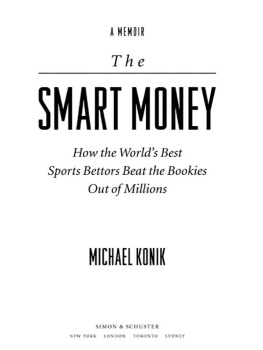

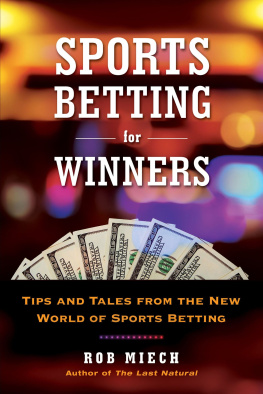
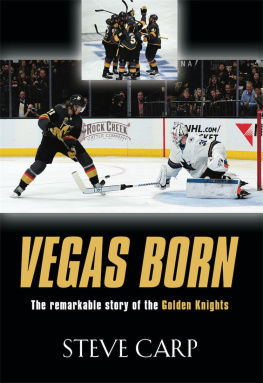
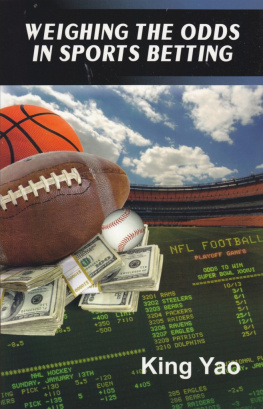

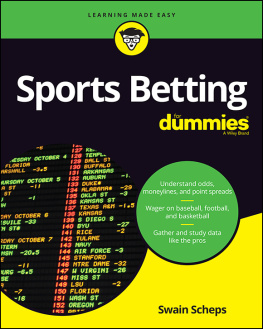

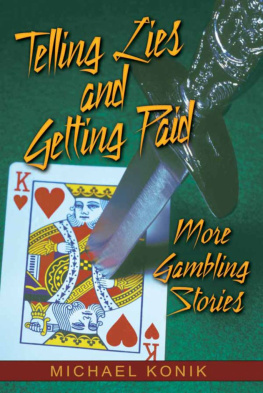


 SIMON & SCHUSTER
SIMON & SCHUSTER